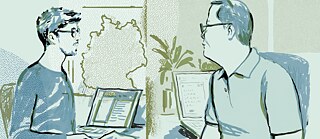South Korea’s Way of Digitalisation
Education Means Isolation

South Korean philosophy professor Kwang Sun Joo answers the question posed by Brazilian artist Rosana Paulino: “How do parents in South Korea react to their new role as digital educators alongside teachers? How are families supporting students in regard to an educational setting that places strong emphasis on digital content?” It becomes clear that digital education causes isolation and poses major challenges for single parents.
By Kwang Sun Joo
Because of the pandemic, we have this unprecedented situation where face-to-face lessons are no longer possible. In the beginning of 2020, our schools in South Korea have re-opened again online. The first generation of online education emerged. That was a shock to everyone. Furthermore, due to online learning, the educational gap that has existed between different home environments even before the Corona pandemic, has become more severe. That is because students generally have a hard time with self-directed learning. Of course, there have been lectures made for Youtube already before the pandemic. And in 2015, K-MOOC (Korean Massive Open Online Course), which was initiated by the government in universities, was provided for free in the internet. Even though students could earn credits by studying through that website, it was not used much. That is because it is not easy to study self-efficiently without guidance.
If that is the case for university students, it must be even harder for children and teenagers. Without question, South Korea’s technology of information and communication is developing as we speak. Hence, in these times of the pandemic, online learning is provided not only to university students, but also to elementary, middle and high school students, while many of them have computers at home. But surely, this doesn’t solve the problem. For elementary school students for example, their parents have to log them into the system, confirm their attendance and help them with schoolwork, which can be difficult when both parents work, or they are a single parent. Even if that is not the case for middle and high school students, parents are very worried. It is hard to expect good results from university students that are left to their own devices, let alone children. Already at the end of 2020 there was a remarkable difference that showed school achievements according to families’ income levels and backgrounds.
Challenges for single parents
Students able to efficiently self-study, can overcome the difficulties that digital learning brings about, but such students are rather rare. And how much parents are capable of supporting their children’s schoolwork, is directly connected to their level of knowledge, educational degree and family background. The consciousness of the child’s learning does correlate to the parent’s level of income to some extent. There is also a direct connection to private education. Even before the pandemic, education in the private sector - in the so-called hagwons, the private educational institutes in South Korea - was prevailing, which put a strain on public education. But the quality of private education that a child can get, also depends on how much the parents earn.When it comes to private lessons, it doesn’t matter whether both parents work or whether one is a single parent, whereas home schooling is almost impossible for these families. And grandparents that raise their grandchildren on their own are practically unable to provide neither private education, nor home schooling. Also for school teachers, it wasn’t easy before the pandemic and it is even harder for them now, to compete with the private education sector, but also to take over the parents‘ role as learning support. Though teachers can call or message parents of students who don’t attend an online lesson, it is hard to do that if they are the only ones in charge of many students.
Less socialisation
Digital schooling and social distancing have isolated children from the outside world and now they are exposed to media at home for many hours a day, which increases the time they spend bored and by themselves. If we think about it, school isn’t just a place to study, it is also a place where children play with their friends and time they spend with media is reduced, because students are more or less forced to sit at their desks. Therefore, digital schooling does not only degrade students’ efficiency of studying, but also the building of friendships among them. Consciousness about socialisation and a feeling of community are also diminished. Aside from that, the time students are exposed to media - including social media – has increased. That is causing parents a lot of worries.COVID-19 caused isolation from the outside world, which not only lead to students sleeping less regularly, being depressed and lonelier, but also caused them to have a more chaotic diet. That is because schools provided a space for having lunch in a group. The nutritional scale of free meals is not that high, but children from poorer social backgrounds tend to eat even more poorly. That is, they either eat food of poorer quality or eat much less compared to before, because they used to be able to get more balanced and free meals at school.
COVID-19 forces us to look at the inequalities and inefficiencies that existed in the South Korean society concerning education even before the pandemic. Now we not only have to think about the problems of digital learning, but also about the problems that we had before.
From my perspective as a South Korean who has already lived in Germany for some time I wonder, if in the era of digital learning has the social inequality in Germany increased its influence on education? If so, how has it increased? And what can be done to solve this problem?